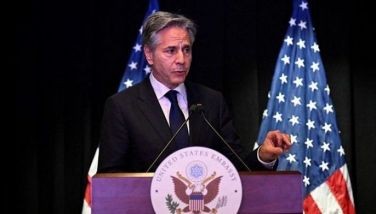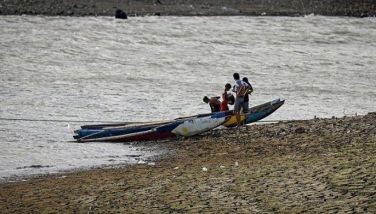More world leaders arrive for APEC summit
MANILA, Philippines - As more leaders of Asia Pacific Economic Cooperation (APEC) economies – including US President Barack Obama and Chinese President Xi Jinping – arrived in Manila yesterday, the Philippines vowed not to leave nothing to chance in ensuring the success of today’s meeting of leaders.
“We’ve been ready in terms of everything – the venues, even the specific rooms at the PICC where each event will happen,” Foreign Affairs Undersecretary for international economic relations Laura del Rosario said.
“I think you know that aside from the APEC Leaders’ Retreat, there will be an informal conversation between the Pacific Alliance leaders and the APEC leaders. So we’re preparing for that also,” she said.
At today’s gathering, President Aquino said they hope to keep the focus on attaining inclusive growth while acknowledging other global challenges like terrorism, climate change and even pandemics.
“Every year, the leaders of the 21 member-economies gather in a single place to chart the future of the Asia-Pacific. As President, it has been my privilege to take part in these gatherings over the past five years – and each time, I cannot help but be impressed by what APEC has been able to achieve,” Aquino said.
Scheduled to arrive in Manila today are the leaders of Japan and Singapore.
Aquino said APEC meetings allow leaders to engage in free-wheeling discussions with other leaders and with various interest groups.
“Some might think that this is an obstacle to productivity. They would be mistaken. When we come together in APEC, we are united by the desire to bring stability, security and prosperity to our peoples. We work together; we cooperate; and we have done so much towards this end,” Aquino said.
The President noted that APEC discussions have given birth to various trade and investment commitments.
“Because this is first and foremost an economic forum, these commitments would not have materialized without the help of the private sector, which is why we are all here in this SME summit,” he said, referring to small and medium enterprises.
“It is an acknowledgment that we will never be able to bring about transformation solely by revising policy or by working on the level of institutions. No, positive change takes place on the ground, and requires the partnership of men and women like you,” Aquino said.
In a statement, APEC Secretariat executive director Alan Bollard said Asia-Pacific economies continue to grow but at a moderated pace on account of slowing global trade.
This prompted the adoption of next generation trade- and growth-boosting measures that target the region’s emerging middle class consumers.
Growth among the APEC member-economies softened to 3.1 percent in the second quarter of 2015, from 3.2 percent in the first quarter and 3.4 percent a year ago, according to the latest APEC Economic Trends Analysis launched at a news briefing in Manila.
“Economies across the Asia-Pacific continue to grow but find themselves in a holding pattern of lower growth in the absence of high trade volumes,” Bollard said.
“Private consumption is helping to compensate but must be tapped into more aggressively to keep the regions’ economies on track,” he added.
Bollard said market uncertainty and protectionist pressures were a concern, but trade-distorting measures had been generally kept at bay.
“The fact is that economies in the region are still highly trade dependent and opportunities to grow are very much out there, but there is a recognition in APEC that traditional approaches are not enough,” he said.
“When you have large sections of the economy that are participating at suboptimal levels it can greatly undermine progress,” he added.
Foreign direct investment inflows to APEC economies dropped 22.1 percent to $651.8 billion in 2014 compared to $836.9 billion the previous year, reflecting investors’ bearish sentiments. Outflows from the APEC region increased by 5.1 percent in 2014, slower than the 7.5 percent pace recorded in 2013, a statement from the APEC Secretariat said.
Inequalities remain
While trade growth in the past quarter century may have lifted incomes as research showed, it has not significantly contributed to reducing inequalities in the APEC region.
“Policies such as human capital investment, social protection, labor market reform, financial market reform as well as institutional reform could help to ensure that the benefits of economic integration are widely felt,” said Denis Hew, director of the Policy Support Unit of APEC, which authored the research.
“Working out the details is something that will take time but ultimately determine whether the value of greater interconnectedness can live up to its full potential,” Hew said.
“Efforts by APEC member-economies to support micro, small and medium enterprises to globalize and gain access to international production and supply chains are important steps in the right direction,” Hew said, adding “policymakers in the region will furthermore need to implement an appropriate mix of monetary and fiscal policies combined with structural reforms to achieve more resilient, sustainable and inclusive growth.” – With Delon Porcalla, Cecille Suerte Felipe
- Latest
- Trending



























